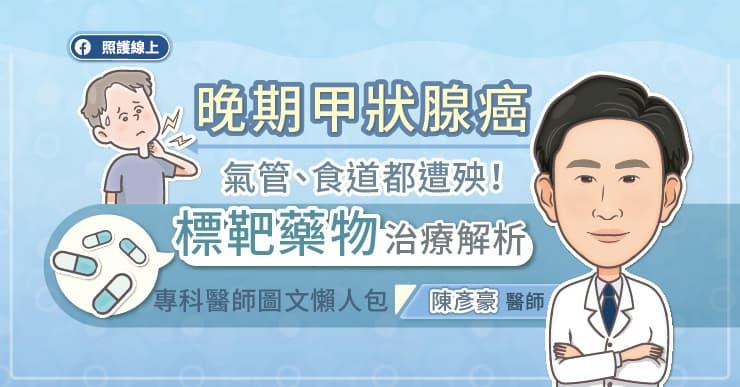“A man in his 70s came to the clinic with a very large tumor on his neck. It was located in the center of the neck, about 7 or 8 centimeters. It had invaded the trachea and compressed the esophagus, making the patient unable to speak or eat. My breathing is also short of breath,” said Dr. Yanhao Chen, associate professor of the Department of Hematology and Oncology at Kaohsiung Chang Gung Memorial Hospital.
Because he was not suitable for surgery, after he was diagnosed with thyroid cancer and genetic testing showed a BRAF gene mutation, he discussed with the patient and decided to use targeted drugs targeting the BRAF gene mutation.
After combined treatment with dual-target drugs, about 3 months later, computed tomography examination showed that the treatment was very effective and the tumor shrank significantly. The patient no longer needed a tracheostomy. Moreover, he was already unable to swallow and needed to be fed through a nasogastric tube. The patient gradually became able to eat through the mouth. The disease is currently under stable control and dual-target drug treatment is continued.
Thyroid cancer is a common cancer of the endocrine system. Dr. Chen Yanhao said that in general, the incidence rate is higher in women than in men. Possible risk factors include radiation exposure, family history, etc.
Thyroid cancer is a slow-growing cancer that often has no obvious symptoms in its early stages. However, as the tumor slowly grows larger, the patient may develop neck lumps and neck pain. If it affects the esophagus, it will cause difficulty swallowing. If it affects the recurrent laryngeal nerve, it will cause hoarseness. Or if it affects the trachea, it will cause difficulty breathing.
If relevant symptoms are found, the doctor will first perform a physical examination, evaluate the appearance and perform palpation, and then arrange a thyroid ultrasound examination. If nodules, tumors and other lesions are found during the thyroid ultrasound examination, fine needle aspiration may be performed. , remove a small amount of cells for cytological examination, and if necessary, use thick needle sections to submit them to pathologists for pathological analysis.
According to cell type, the more common thyroid cancers can be roughly divided into papillary cancer, follicular cancer, medullary cancer, anaplastic cancer, etc. Most thyroid cancers in Taiwan are papillary cancers, and other follicular cancers, medullary cancers, and anaplastic cancers together account for about 10% to 20%.
Dr. Chen Yanhao said that for thyroid cancer that can be removed surgically, surgery combined with radioactive iodine therapy (I-131) can be used. Systemic therapy must be considered for metastatic thyroid cancer that is resistant to radioactive iodine therapy.
The use of first-line targeted drugs to treat locally recurrent or metastatic thyroid cancer can significantly prolong disease progression-free survival. However, patients are prone to some side effects that require close observation, such as fatigue, nausea, vomiting, diarrhea, high blood pressure, proteinuria, etc. Some patients respond well to targeted drugs, but the impact of side effects is more serious, and as the time of use increases, patients may have to stop taking the drug because the side effects last longer and become more severe.
When first-line targeted drug treatment is interrupted for some reason, genetic testing can be considered. Dr. Chen Yanhao said that there are currently corresponding target drugs that can treat gene mutations such as BRAF, RET, and NTRK. If the patient is unable to receive first-line targeted therapy, other targeted drugs can be used to control the disease.
Since each patient’s situation is different, the time point for genetic testing will also be different. Dr. Chen Yanhao said that some patients may undergo genetic testing at the initial diagnosis, and some patients may undergo testing only after current drug treatment fails.
After receiving treatment for thyroid cancer, many patients need to take thyroxine regularly. Because the absorption of thyroxine is easily affected by other foods or drugs, patients are advised to take the drug on an empty stomach in the morning and wait an hour before eating or taking other drugs. In addition to taking medication on time, regular follow-up examinations are also required to evaluate the status of disease control.
Thoughtful reminder
Thyroid cancer is a common cancer of the endocrine system. It grows slowly but may invade the trachea and compress the esophagus, affecting eating, speaking and breathing. Dr. Chen Yanhao reminds that if you find a neck mass, neck pain, difficulty swallowing, hoarseness, etc., you should seek medical examination as soon as possible.
At present, most thyroid cancer patients are mainly treated with surgery. After surgical resection, radioactive iodine (I-131) treatment is arranged according to the situation, and most patients can achieve good control.
With the development of precision medicine, genetic testing is gradually applied to thyroid cancer. Currently, genes such as BRAF, RET, and NTRK are more commonly tested. After it is determined that the tumor has relevant gene mutations, corresponding drugs can be selected for local recurrence or metastasis of thyroid cancer. Targeted drugs help improve treatment effectiveness!
This picture and text are reprinted with permission from “Care Online”. The original source is Advanced thyroid cancer affects the trachea and esophagus!Analysis of targeted drug therapy, a lazy pack of pictures and texts by specialists
2023-10-16 02:38:28
#Advanced #thyroid #cancer #affects #trachea #esophagus #Analysis #targeted #drug #therapy #lazy #pack #pictures #texts #specialistsGrid #vocus


